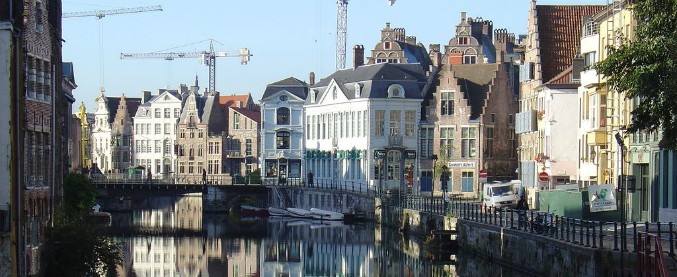In Gent, welcoming and multicultural city in Europe. That’s why muslims are afraid of it

“Be careful, please. It is dangerous,” I am told by a friend from Gaza.
“You’ll get in trouble,” I am told by a friend from Iraq.
“We are worried for you,” I am told by another friend from Syria.
It’s something I am told quite often, actually. Not when I am heading to some front line, yet; when I am about to give a speech. When I am invited to a conference. A TV program.
When I am in Europe, not when I am in a conflict zone.
Because when I speak, sometimes I speak of Islam.
And sometimes, favorably.
I use to speak of Islam more as culture than faith, honestly. But I happen to mention the countless beautiful things I have learned during these ten years among Muslims: little things, for example the habit of breaking bread, instead of cutting it with a knife, because bread must be hold in high regard, and honored: or welcoming guests with water, water first, because water is scarce and precious, I have learned not to take for granted to be neither hungry nor thirsty, and to never ask absent-mindedly: How are you doing?, as a rhetorical question, as we do when we come across someone we know, but only if I am ready to listen, then, to care: because it is a major question – or also more demanding things, like getting rid of our quid pro quo, our idea of trade-off, because you should also give without expecting anything in return, love even at a loss, as Father Tonino Bello would have said, give without being asked to give, and actually, before being asked to give, because asking can be hard: can be awkward: and what’s more, we should receive without giving, which is equally hard, oddly enough, because receiving, just receiving, reminds us of how vulnerable we are, never independent from each other: never islands, in the words of Abraham Joshua Heschel. Who was a rabbi, instead.
I mean, this kind of things.
Innocuous things.
And I have mentioned them here as well. In this Flemish town where we are talking of migrants in one of those typical festivals that make you think that if the world were all like this, it would be a better world – because everybody looks nice, in Ghent, and kind, looks curious, and sensitive, and warm-hearted, everybody tries to help the others, in his own small way, and like Gandhi, no?, everybody tries to be the change he wishes to see, and even your coffee is served by a barista with Down’s syndrom who has no Down’s syndrom, here, he is just the barista. And so I look around, and I wonder: To be careful? And why?
Of what, of whom should I be scared of?
And yet, that’s what I am always told. And told by all. All, but really all Muslims I know. They are all afraid to show that they are Muslim.
Afraid of being what they are.
And it’s striking, always. I feel uneasy. Because they are afraid not only of Islamophobes: they are afraid of all of us. With no distinction whatsoever. And I feel uneasy because it is a fear I can’t understand. And so I look around, in this Ghent which is so open, so plural, this Ghent where I am so at home, and I ask myself: What is, here, that I am unable to see? In what we are saying in these days, we, Europeans, liberal heirs of the Enlightenment, champions of the freedom of thought and expression: What is, that I am unable to grasp? Because be it real or not, that’s what Muslims perceive: that if you speak of Islam, if you show you are Muslim, you get marginalised, isolated. You get censured.
Or judged, anyway.
If you speak of Islam, you get in trouble.
I think of Stanley Greene, the American photographer I wrote for. I think when we were on the field together. And right away, he drew the attention of all other journalists, because he looked like a rockstar, with all his rings, earrings, a bandana. His leather jacket. And no one ever noticed the only detail that really made him different: he was the only black.
No one ever noticed that we are all white. Still today.